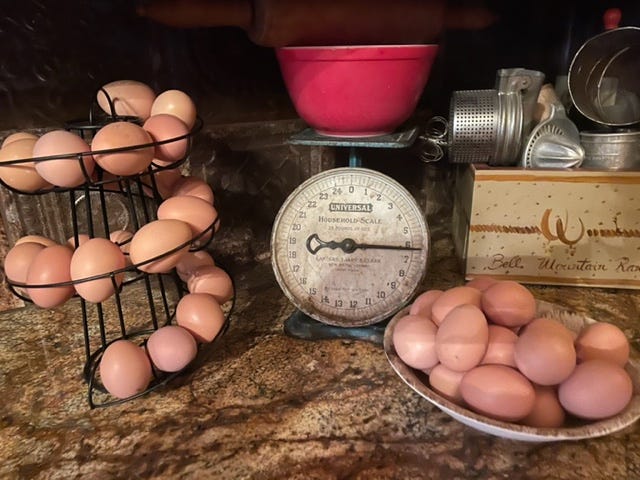Are you still believing this myth? The cashier I met at the health food store does!
The cholesterol myth and why people cannot accept it as a myth
Cholesterol Deception: Even the health-conscious still believes in it.
I was in my local natural grocery store the other day. The cashier said to me, “You must have a cat.”
I looked at him strangely and replied, “No, I do not. Why are you asking?”
“Well, because you are buying catnip.”
I explained that the bags of herbs I am purchasing are for my chickens. Some herbs are calming, which can aid in egg production, and others are antimicrobial to prevent pests and mites in the coop.
He responded, “You can feed your chickens flax to reduce the cholesterol in the eggs."
I looked at him, smiled, and said, “I am not concerned about the cholesterol in the eggs.”
His eyes grew wide with a shocked look, and he responded, “People are concerned about their cholesterol levels.”
After checking out, I ended the conversation with, “As a nutritionist, I am not concerned about the cholesterol amount in eggs.”
Whole foods high in cholesterol and the myth that they cause CVD
This person and many others think that eating whole foods, such as eggs, that contain cholesterol will increase your cholesterol level, which will automatically increase your CVD risk.
There are two parts to the above statement, and both are incorrect.
Higher cholesterol levels are not necessarily harmful. It is the oxidized and inflammatory cholesterol that is harmful. That type should be addressed, yet most doctors don’t even test for this, so how would you know?
Cholesterol that is not oxidized is not a risk factor for CVD.
It is not the healthy, nutrient-dense, whole foods in the diet that put you at CVD risk. It is all the fake foods, from the chips, cookies, and donuts to the pasta, bread, pizza, and bagels to the fake bacon, fake burgers, fake processed cheese, and so forth.
It is a diet that contains refined carbs, refined sugar, and unhealthy fats that can contribute to CVD. It is not pasture-raised organic eggs! In a general lipid panel, elevated triglycerides typically indicate a diet high in sugar and refined foods. However, you also do not want your triglycerides to dip too low, as they support energy levels.
So when the doctor puts you on a statin because your total cholesterol and LDL are considered “high,” know that in trials, the pharmaceutical company only had to show that a statin reduces cholesterol. It did not have to show that it reduces cardiovascular disease risk or that a statin reduces mortality.
It will lower your TC and LDL. So what?
Research indicates a statin will increase your life span by…four…DAYS!
So why are 40 million adults in the US on a statin drug?
Over 82.6 million people in the US have heart disease and CVD is the number one leading cause of death for Americans.
Shouldn’t CVD mortality go down, not up, with so many people taking a statin?
Studies indicate that a high total cholesterol level in older women (over 65) is heart-protective.
Reduce your CVD risk by modifying your diet and lifestyle and getting the proper testing done.
Omegaquant.com has a dried blood spot omega-3 index test, which may be more beneficial than the basic lipid panel. The test results will show you which range your omega-3 levels are in, your ratio of omega-3 to omega-6, your arachidonic acid to EPA ratio, and your trans fat index.
On the test, the higher your omega-3 level is, the better. Omega-3 intake will reduce triglycerides, can improve HTN, is anti-inflammatory, and reduces CVD risk.
The omegaquant test is a simple dried blood spot test you can order independently. I suggest everyone have a baseline and then re-check it yearly.
The cardiovascular panel that I can order for you (I am still working on finding a lab for the local Pagosa Springs, CO folks!) is a blood panel. I have attached below what this test includes for $350 (includes a 30-minute Zoom call review and emailed individualized plan).
Or a lipid panel via Labcorp (for Pagosa Springs area residents, the closest lab is in Durango). This test is not as easy for the patient to read, but it is still a good choice and a more affordable option (test and 30-minute Zoom review and emailed individualized plan is $200).
The test includes:
NMR with IR Lipid Profile (884000)
LDL-P, LDL-C, HDL-C, Triglycerides, Cholesterol, Total
HDL-P (Total), Small LDL-P, LDL Size, Insulin Resistance/Diab. Risk
Large VLDL-P, Small LDL-P, Large HDL-P, VLDL Size, LDL Size
HDL Size, Insulin Resistance Score, LP-IR Score
We did not get to where we are with the rising rates of heart disease by eating eggs!
Pay attention to how many boxed and packaged foods you eat and how many whole foods you eat. Does the scale lean more toward fake or real foods?
Source and more information on statins https://expose-news.com/2023/11/10/statins-are-not-the-wonder-drugs-they-are-metabolic-poisons-that-kull-one-cell-at-a-time/
Do stents for heart disease make a difference?
Researchers have found that diet and lifestyle plus a stent had the same outcome as diet and lifestyle without a stent. It would make sense then to forego the surgery; however, many people will choose the option that was not mentioned-no diet and lifestyle changes and have the stent surgery. Sad to say that this is the option many would choose-thankfully this is not you, or else you would not be reading my substack!
The point is, in many instances, the surgery can be prevented just by adding in movement and eating whole foods.
Source: https://www.brighteon.com/4adfb727-8b04-4ef2-9695-676d915d30c1





